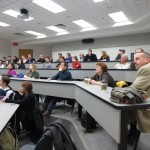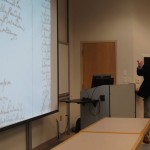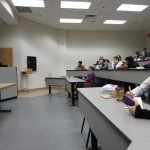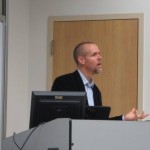Dr. Anne Dance is offering History 3473: “Frontiers in World History” from 28 April to 22 May, Monday-Thursday mornings from 9:00AM – 11:30AM.
This course links local history with World History by examining the connection between the histories of frontiers familiar to students with those more distant to them. Students will gain an appreciation of the importance of frontiers to historical events and processes as well as the impact of human history on frontiers.
Dr. Dance graduated from STU in 2007, and went on to complete an MA in History at the University of Victoria and a PhD at the University of Stirling, where she was a Commonwealth Scholar. She has also worked in the House of Commons and held a variety of public policy positions. Her current research areas include the creation of public space on Parliament Hill, an environmental history of Manitoba feminist and agricultural expert E. Cora Hind, the intersection between farming and hydroelectricity generation in British Columbia, and the reclamation of the Athabasca oil sands and the Sydney tar ponds.
We are delighted to announce that Pierce Bailey, a History Honours student who graduated in 2012, has been admitted to the MA programme at McMaster University, with an International Academic Excellence Scholarship, a Graduate Scholarship, an Entrance Scholarship, and a TA ship.
Pierce will study under the supervision of Dr. Tracy McDonald, as his work will examine perpetrators of Stalinist terror during the 1930s and 1940s with particular focus on the question of why people participated in mass violence.
From 28 April through 22 May, 9:00-11:30 am. Mon-Thurs.
“This course examines how societies have imagined, represented, and interacted around so-called “frontiers” in world history. It explores places where trade, migration, conquest, and other cultural exchanges have had a profound impact on societies and even produced new cultural configurations. No prerequisites.”
Four students from the STU History Department shared their research at the 2014 Atlantic Universities Undergraduate History & Classics Conference (AUUHCC) held at UPEI on 7-9 March.
– Kathleen King, “Disney Meets the Powerpuff Girls: Race, Gender and ‘Girl Power’ in the 1990s”
– Michael F. Maloney, “Barometers of Nineteenth-Century Agricultural Transformation: Evolution of Single-Furrow Walking Ploughs in West-Central New Brunswick”
– Stephanie Violette, “Clay vs. Tin: The Cultural Significance of Handmade and Factory-made Inkwells in the Nineteenth-Century Home”
– Michael Haley, “A Society of Change: Tracing Canada’s Growing National Identity, 1943-1953”
Wednesday, March 19, 2014
Many thanks to Dr. Jim Sweet from the University of Wisconsin-Madison who gave a stimulating and inspiring World History talk to an attentive audience at STU.
“In January 1769, the crew of the British slave ship “Black Prince” murdered their officers a few hundred miles off the West African coast, changed the name of the ship to “Liberty,” elected new officers and set sail for Brazil. Riven by petty jealousies and mistrust, some crew members were abandoned in Brazil and the Caribbean; others were murdered; and a handful survived shipwreck on Hispaniola before fleeing to Suriname, Boston, New York and London.
Dr. Jim Sweet of the University of Wisconsin-Madison will use the history of the “Black Prince” mutineers to reflect on broader issues related to the study of World History. <more>
Source: General Event
Wednesday, March 19, 2014
Congratulations to Matthew Pain, a History Honours student in his final year at STU, who will represent the university at the Research Symposium at the University of St. Thomas in Houston, Texas this year. He will present “Policy in Israel Before and After 1948: How Agricultural Management Has Shaped a Collective Palestinian Identity.”
Several History students are presenting their work at today’s Research & Ideas Fair.
1PM, BMH 108
Andrew Knowles, “Meiji Japan: Striving for Westernization through Banquets”
Michael F. Maloney, “Barometers of Nineteenth-Century
Agricultural Transformation Evolution of Single-Furrow-Walking Ploughs in West-Central New Brunswick”
2:50PM, BMH 102
Kelly Ferguson, “Light it up: Kerosene Oil and the Changing Lives of Rural Canadians, 1850-1910”
2:50PM, BMH 108
Stephanie Violette, “Until Death Do Us Part: Binaries and Balance in the Wife of Bath’s and the Franklin’s Breton Lais”
2:50PM, BMH 204
Matthew Pain, “Policy in Israel Before and After 1948: How Agricultural Management Has Shaped a Collective Palestinian Identity”
Bliss White, “We Must go to the Orient:” Bonaparte, the Near East, and the Legacies of Crusade and jihad, 1798-1801″
Sunday, February 23, 2014
Check out what the STU History faculty and major/honour students are up to.
Here is the latest History Honours Newsletter:
http://bit.ly/1fv5XgD
 Dr. Julia Torrie has been awarded one of the two McCain Awards to help her complete her book entitled “Living Like God in France: The German Forces of Occupation, 1940-44.”
Dr. Julia Torrie has been awarded one of the two McCain Awards to help her complete her book entitled “Living Like God in France: The German Forces of Occupation, 1940-44.”
“Living like God in France” tells the story of the German occupation of France from the occupiers’ perspective. Unlike their comrades on the miserable Eastern Front, German soldiers in France spent most of their time simply holding terrain, building defensive structures, and policing the local citizenry. France offered many opportunities for leisure and pleasure, yet soldiers’ duty was never far below the surface. Living like God in France explores German soldiers’ contradictory experiences as occupiers, caught between duty and pleasure, violence, tourism and consumption. The book argues that “managing” occupiers is, in many ways, as complex and significant a task as managing the occupied country. The interplay between top-down initiatives and the experiences and perceptions of ordinary soldiers is crucial to understanding how occupations work.
Friday, December 13, 2013
Two of the General Research Grants awarded by the Senate Research Committee have gone to History faculty in November 2013:
Dr. Rusty Bitterman for his project “London Merchants and Early 19th Century Prince Edward Island: Contextualizing the Gosling Family’s Colonial Investments”
and
Dr. Bonnie Huskins for her project “World historical processes in William Booth’s world: using social biography to study war, slavery, trade and social support networks in the 18th century”




